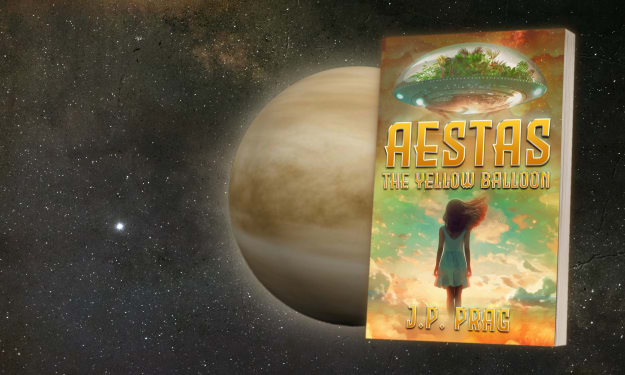Us Among the Stars
Everything in the universe moves apart.

Angelica, I’ve thought so many times about how different my life would be if you’d died just two hours earlier. If you died in our mother’s womb, you’d be something other than my dead sister. You’d be an almost, a never-born, a near-sibling.
But you were born. You wheezed softly, tragically, as you lay on our mother’s chest, while I, the sister with vitals worth saving, was incubated and tubed, set aside in a plexiglass box.
I don’t know if the power by which the dead are allowed to return to us comes from having lived, if yours came from the few gulps of air you took in. But I wonder now, at the end of everything, if all along I wasn’t just following you to the edge, trudging clumsily in my graceless body through your holy slipstream.
***
On the ship Vicis, known informally with its sister ships as the Wandering Colony, the suicide of Mark Abernathy is societally unimportant. With some shame, we might even acknowledge his death as beneficial. Aboard a colony ship providing for over 15,000, Abernathy is old and taking up space. Was, I should say.
Vocationally, however, his death is notable. Abernathy was the second chair in the Physics Unit. His work to plot the course of the Wandering Colony ships is both high profile and essential to our survival.
As the case’s lead investigator, I’ll be charged with recording the details of the death and filing the report. It won’t take long. The autopsy will undoubtedly show an overdose from the bottle of sleeping pills open and empty beside him. All that’s required of my investigation is to log anything important that can be found in Abernathy’s notebook.
The leather-bound black notebook found clutched in Abernathy’s frail hands is much like the man himself: small, unassuming, and worn around the edges. The second investigator, whose name I can never remember, logs it directly into my custody at the scene, though I don’t bother opening it until later that evening, in the relative comfort of my cramped quarters.
I pour a glass of grain whiskey and unlatch the space-saving desk fitted against the wall. Retrieving the file and the Dr.’s notebook, I begin to read.
I don’t know what I expect to find in a physicist’s notebook. Complicated formulas, or, considering his demise, perhaps a goodbye. What I find instead are riddles.
Everything in the universe moves apart. This is nature.
It’s hardly a comprehensive or original take on the expanding universe theory. I flip the page.
The tequila bottle is empty and no one knows. Who drank the worm?
The vague entries are more annoying than intriguing. These musings take up a good portion of the notebook. The rest is occupied by transactional records that I might mistake for a black marketer’s bookkeeping if I didn’t know Abernathy was one of the colony’s high-ranking scientists.
A card falls from a pocket on the inside cover. It’s a credits card. I hold it to my watch to scan it.
That can’t be right. I scan it again.
$20,000 in credits should be impossible. No one accumulates wealth on Vicis, certainly not crew. After room and board, most are lucky to be able to occasionally indulge in soap that doesn’t smell like lye or a bottle of whiskey.
What’s as remarkable as the amount, Abernathy’s credits are untraceable. The scan turns over no name, no ID, no transaction history.
I’ve seen these cards before. In every society, inevitably some contingent develops an appetite and an aptitude for being anti-social. The fringes are built and maintained by those who don’t particularly want their purchases recorded or their communications listened to. They prefer the edges and the shadows. Over time, they become adept at navigating a course below the center of things. The bootleggers of Vicis have thrived since before I was born.
You might think that on a ship of just 15,000 with its own Investigations Unit, we’d be able to snuff out illegal operations, and of course we could. The truth is, the fringes can be quite useful. Their very existence reminds people that they live in a free society, one that isn’t totalitarian or tyrannical. That the fringes operate mostly unhampered reminds people that we’re not here to crack down on anything so petty as privacy.
Abernathy’s financial logs begin to make sense. He apparently had a bit of fringe in him. From what I can put together, he sold off old lab equipment, medications, computer systems. I should be making note of all this but briefly my mind explores what I might do with Abernathy’s untraceable funds. Fresh coffee, wine made from grapes instead of apples. Stasis.
Stasis is the Elysian Plain of the Wandering Colony. In stasis, the very wealthy can remain young and healthy until we discover a world worth growing old in. They sleep while generations grow old and die in sunless tin cans.
Considering the peace of stasis, I twist the small glass vial of ash around my neck. The necklace was my mother’s, the ashes my sister’s. If Mother were alive, she’d remind me that Angelica was watching. My baby sister was Mother’s only real religion, the only god she endowed with the power to judge us from the ether.
Make your sister proud.
Of course I’ll report the card and its credits in the morning. It’ll probably be the talk of the Investigations Unit for weeks, the scientist with an underworld credits estate.
But in the morning it’s clear that Abernathy’s black market wealth won’t be the talk of anything. By the time I arrive, the department is already buzzing with something more exciting. An actual murder on board, the first in years.
The husband did it, which is almost always the case, but the circumstances are strange. He claims it was his brother, not his wife, whom he attacked. It makes no sense, not least of all because the man’s brother died at the age of six. Still, the husband claims that not only was it his brother who entered his home, but that he was fully grown.
The department debates enthusiastically on how nuts the man is, or how nuts he wants us to believe he is to get a more lenient sentence. It’s after I leave the noise of the department that I realize I’ve forgotten to log the credits card into evidence.
***
In the Physics Unit, first chair Dr. Blakely, treats me and my inquiries as a hassle. He answers questions reluctantly, with heavy sighs. Blakely is surprised by Abernathy’s side business, but mostly unbothered, acknowledging the illegal enterprise with a shrug.
He is, however, disturbed by the obscure entries that I read him from Abernathy’s notebook.
Envision the end as the beginning.
The tunnel unfolds terror.
Blakely sucks in his breath like he wants to say something. It takes some prodding and a good deal of assurances on my part that Abernathy’s reputation won’t be posthumously tarnished before Blakely will share with me that Abernathy had a peculiar theory.
Abernathy believed — without any evidence that should persuade a physicist, Blakely notes — that the Wandering Colony had gone through a wormhole some months ago, that we were now all living in a reality altered by the journey, one that would inevitably kill us all.
Blakely can’t say much about why Abernathy believed we’d traversed some spacetime anomaly, only that he claimed the after-patterns were undeniable. Under his breath Blakely notes how much like “magic” Abernathy claimed things were now.
“Madness isn’t strictly disqualifying in the scientific community,” he tells me when I ask why Abernathy’s employment wasn’t terminated.
The insight into Abernathy’s mental state should provide some sense of closure but I leave dissatisfied and painfully curious.
***
This night, like most, I dream of Angelica. It’s odd, but I never dream of her as a baby. I dream of her as exactly my age. I suppose my mind is able to construct her adult form out of my own, a twin with only slight differences. Her hair is lighter, her smile easier, her face brighter. She speaks to me but I never hear what she says, her voice lost somewhere in the space between us. I wake with the relief that I’ve escaped something, that I’ve come out of a nightmare.
Two hours later, I realize that I haven’t woken from the nightmare. I’ve woken to it.
Aeta, one of the ships of the Wandering Colony, is missing. Vicis finds itself in a state of panic and strife. Everyone knows or loves someone aboard Aeta.
Then, just when it seems the unthinkable has passed, it stretches its arms and extends its claws. The unthinkable isn’t done with us yet. Three days after its disappearance, no one can seem to remember Aeta or anyone on board having existed. There are log entries and photographs and comms to and from the ship, but it lives in not a single person’s actual memory.
As Vicis devolves into something like a collective existential crisis my mind is constantly on Abernathy and his theory. In his journal, one entry sticks to my brain like gum.
Your life will leave you bit by bit and you won’t even miss it.
Blakely isn’t available for calls or visits, presumably too busy with all those scientific questions that must come up after a whole ship disappears. Part of me thinks that the Aeta anomaly may have him reconsidering just how mad Abernathy’s theory was.
The panic that weaves in and around everyone on board plucks at my nerves and I spend most hours hiding out in my quarters. When I fall asleep, Angelica comes to me. When I wake, she doesn’t always leave right away. She hovers as I struggle to move, frozen in fear as she stands over me, speaking soundless words.
There’s no time to recover from Aeta. Terrible changes begin to drop like hammers, though no one can quite pinpoint what it is to be there as it happens.
We’ll stand in the corridor as a pet-dog walks by, and we’ll be utterly horrified that the thing has two heads. Then, a moment later, it won’t seem so odd. A few moments after that, someone might even remember a tw0-headed retriever that slept at the foot of their bed growing up.
Then there’s Frank, the second investigator whose name I finally remembered, who sometimes looks up from his desk with such an expression of existential misdirection that I’m not sure he’s really Frank, who responded to the sergeant’s “Hey Frank” with a quiet and confused, “My name is Alma.”
In just a couple of weeks, we all have our own two-headed dogs, our own Franks. Most don’t talk about it. The investigators do their part to keep people calm and keep their mouths shut.
I keep my mouth shut too, unable to find a way to share Abernathy’s theory. It can’t possibly make any difference at this point. Abernathy hadn’t discovered a catastrophe to avoid. He’d discovered one we’d already experienced.
Angelica is with me often, lingering more and more when I wake. Too many things are inescapable. That’s why Abernathy’s gone after all. He understood the inevitability of falling apart. Still, his route is unappealing. Too final, too decisive. What I want isn’t death... it’s escape.
The cost to enter stasis takes nearly all the money on Abernathy’s card. The technician charges the remaining balance for running untraceable credits.
In stasis, I’ll die or I’ll live. It doesn’t matter so long as I escape the falling apart. So long as I escape Angelica.
***
But in the dark she is somehow there again. Inches from my face.
“How can you be here?”
“It’s our nature to come together,” she says, her words finally audible.
Everything in the universe moves apart. This is nature.
As though she’s read my mind, Angelica leans in close to respond. In a whisper, she says, “It’s human nature to fight our nature.”






Comments
There are no comments for this story
Be the first to respond and start the conversation.